Summary 
Strong performances in the mature roles - Falstaff and King Henry - bolster this solid overall production. Gritty realism, from unshaven long-haired characters dressed mostly in layers of rags, to a multi-level set of wood framing and metal rivets, is a strength, despite some anachronisms like hoodies and blue jeans. A sexy Kate sparks the scenes with Hotspur and the rebels, and Falstaff at the Boar's Head provides both comic and dramatic highlights. Memorable moments - Bardolph wearing a bucket for a helmet, Lady Mortimer's beautifully sung love song - and both Hal and Hotspur are clearly drawn, but this production is at its best when focused on the exploits of the larger-than-life Jack Falstaff.
Design
Directed by Carolyn Howarth. Scenic design by Caitlin Ayer. Costume design by Hugh Hanson. Lighting design by Jason Banks. Sound design by Jason Ducat.
Cast
Sam Gregory (King Henry IV), Joshua Archer (John), Vanessa Morosco (Westmoreland), Benjamin Bonenfant (Prince Hal), Michael Winters (Falstaff), Ian Andersen (Poins), Bob Buckley (Northumberland), Steven Cole Hughes (Worcester), Geoffrey Kent (Hotspur), Sam Sandoe (Bardolph), David Bolus (Peto), Jamie Ann Romero (Lady Percy), Tammy L. Meneghini (Mistress Quickly), Sammie Jo Kinnett (Francis), Jenna Bainbridge (Lady Mortimer), Paul Ray (Douglas).
Analysis
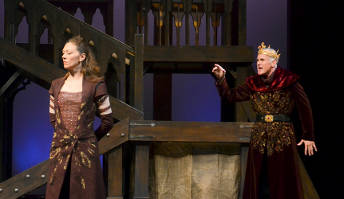
Carolyn Howarth directs 1 Henry IV for the Colorado Shakespeare Festival, and she delivers a gritty and realistic insight into a Prince and the influence on him by three potent personalities. She begins with the guilt-riddled King Henry, wan and more than a little sickly within a yellowish 1.1 spotlight - "so shaken as we are" - haunted by murmuring voices in the background. The stage is a series of deeply-set steps and platforms, all dark weather-beaten wood and gray metal rivets. Sam Gregory's Henry is a subtly-played wreck, physically wracked with guilt over his actions toward Richard II, angry at and afraid of the rebels, and concerned by the wayward behavior of his next-in-line son. Just the mention of Hal's name brings a downward glance of shame from Westmoreland, and Gregory's nuanced King shows embarrassment. Howarth inverts Gregory's powerful 3.2 interaction with Hal with the 3.1 scene between rebel factions, concluding the production's first half with focus on the King's exasperation with the Prince. Gregory's Henry removes his crown and loosens his robe, then yanks his kneeling son - "the shadow of succession!" - to his feet in an uncharacteristic display of anger. His emotions become imbued with a sense of hope, however, when prig prince Hal promises royal change: "you shall find it so." Gregory's King is moved nearly to tears and embraces his son in an almost desperate bear-hug as the lights fade for intermission.
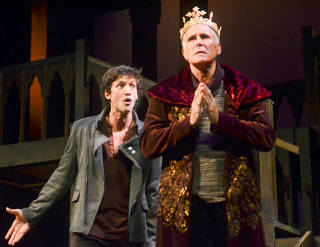
Benjamin Bonenfant's Hal is first seen 1.2, wearing only boxer shorts, rising from a platform in an alcoholic fog, a prostitute on either side of him. Bonenfant plays Hal as a shaggy-haired young party-monster, and he and the rest of the Boar's Head denizens are unshaven, unwashed, long-haired and dressed in rags, all seeming like they could use a shave, bath, a haircut, and some laundry soap. The grittiness is not just for fifteenth-century realism but an insight into the characters, especially Bonenfant's Hal: in 2.4 he humiliates the tavern drawer, allows a prostitute to cup his hand over her breast before he swats her bottom, rubs a written message from the King against his crotch, then bumps bellies with Falstaff and makes jokes about their armed robbery. During 1.2, he drops his clothes to the stage, then finds Michael Winters's Falstaff asleep under a platform and behind a curtain, cradling a bottle of sack. He searches for Falstaff's missing boot, and after some robbery planning, gives the audience his "imitate the sun" confession, then rushes onstage prematurely 2.1, standing beside his rival Hotspur for a long silent moment that invites unflattering comparison.
Winters's Falstaff proves the core of the show, the Knight as expertly played as Gregory's King. He struggles to wash himself 1.2, finally embracing Hal in a warm bear-hug that seems to be a poignant clinging to a friend who will soon be gone as well as to a prince who will soon be King. Fasltaff moves downstage center 2.2 and ingratiates himself to the audience - his gruff boast of "I am the veriest varlet that ever chew'd with a tooth" sounds a bit like cartoon-character Yosemite Sam, delivered with the same ill-advised confidence - and when the robbers are robbed, his cohorts run away, but Winters's Falstaff at least puts up a fight, the last to flee in a brief glimpse of actual courage. The heavy-set Knight - he "lards the lean earth as he walks along" - delivers the production's funniest moments with his 2.4 description of the foiled robbery. He staggers from upstage, looking exhausted but angry, targeting Hal with a pointedly insulting non-insult: "you...Prince of Wales." Falstaff offers a snarky toast - "a plague of all cowards" - then recounts the robbery, his valiant defense against two men becoming four then "these nine." His quick-witted excuse for not injuring the disguised Prince - "I knew ye as well as he that made ye" - is followed by an earnest admission - "I'm glad you have the money" - before they take turns imitating the King.
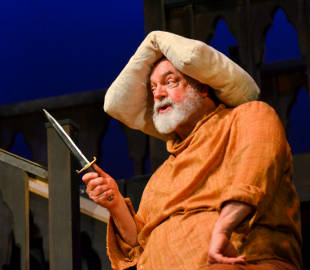
Winters's Falstaff sits atop a wooden tavern table, a pillow atop his head for a crown, and he splashes sack under his eyes to simulate tears for a wayward son while he wields a knife like a scepter. Falstaff understands that he argues not just for his lifestyle, but for his life, and he stabs the stage - "here lies the point!" - suddenly stern and serious. When Bonenfant's Hal takes his place as the pretend-King, Hal describes him as "that huge bombard of sack" and the whole tavern shouts "Falstaff!" but the Knight's suddenly plaintive plea - "banish plump Jack, and banish all the world" - is met with the Prince's ice-cold "I do, I will." The tavern lapses into a shocked silence shattered by the Sheriff's knocks, and Howarth takes pains to show the impact of the words. Winters's Falstaff stands agape before being helped to hide, and Bonenfant's Hal swoons, takes a big swig from a jug of sack, and quickly dismisses the Sheriff to order his friends, "we must all to the wars."
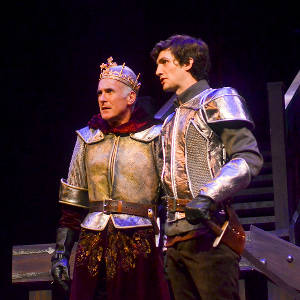
Falstaff, in the second half of Howarth's production, has lost some of his sympathetic nature, and on the battlefield he is cowardly, rendering Hal's ultimate lifestyle choices much simpler. Winters's Falstaff makes his 3.3 Boars Head appeals downstage to the audience, threatening both Bardolph - "amend thy face and I'll amend my life" - and then the Prince, although he does not realize Hal has entered behind him in full dress-military uniform. He lewdly mauls the Hostess, then drums the table at the prospects of the war, and by 4.2 most of his soldiers - culled from a nearby prison - are but "food for powder." Bardolph staggers by with a silver bucket over his head for a protective helmet, but there is no humor in Falstaff marching his soldiers to all but certain death on the battlefield. His falling sense of honor corresponds with the rise in honor of Bonenfant's Prince.
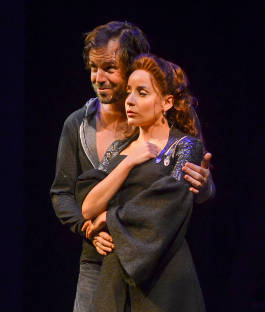
Howarth focuses much of the narrative on Geoffrey Kent's Hotspur, particularly as a counterpoint for Hal. Both Kent's Hotspur and Bonenfant's Hal have an anachronistic contemporary feel in their characterizations, Hotspur something of a Bradley Cooper look-alike in blue hoodie, black leather and bad temper. He wears black motorcycle boots and would fit in at the Boars Head in his uncombed hair and surly edge-of-violence demeanor. During 2.3, his hoodie unzipped to reveal the hair of his chest, Kent's explosive Hotspur shreds the letter with the King's demands and paces, while Kate appears above in jeans and boots. Jamie Ann Romero plays Kate with the same fiery flash as Kent's Hotspur, and she marches down the stairs to slap her husband across the face - "hear you!" - then punch at him. The callow displays of anger are counterpointed with schoolyard antics, and they kick playfully at each other like teenagers with grade school crushes - "do you not love me?" - until he finally grasps her by one thigh, hoists her in the air, and carries her squealing in delight from the stage. In 3.1 the English couple does battle with the Welsh, Kent's Hotspur defying Glendower's flamboyant claims - "the earth did shake" - while the fiery Kate bristles at Lady Mortimer in her bare shoulders and long lace gloves, speaking only Welsh to her husband but singing a beautiful but mournful little tune for him. Mortimer is enamored - "I understand thou kisses, and thou mine" - but the coarse Hotspur gives an exaggerated eye roll at Glendower and after a play for his wife - "come, Kate, I'll have your song, too" - he takes her punch, joins her in applause, then is dragged off by her to their chamber. The rebel soldier confides 4.1 with the burly bald and chin-bearded Douglas the Scot - "doomsday is near!" - amid rolling stage smoke, but by 5.2 he is leading the rebel army - "we live to tread on kings!" - and rallies them shouting offstage as they draw weapons and beat their shields.
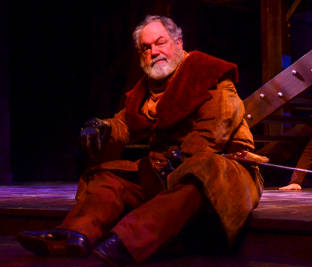
Howarth's conclusion begins 5.1 with Gregory's Henry becoming increasingly ill, coughing at "'tis not well" then cringing and nearly collapsing. Bonenfant's Hal provides a corresponding rise, first explaining - "I have a truant been to chivalry" - then making personal vows: "and so ends my catechism." Sound effects lace 5.3, which is packed with illustrative action, like Douglas dragging Blunt, dressed like a King, offstage by his neck with an axe handle, or Falstaff hiding from the Scot while Bardolph and Peto strip a fallen soldier upstage. Falstaff seems less horrified by the battlefield losses - "there's not three of my hundred-and-fifty left alive" - than in mild surprise, and when Hal reaches for the knight's pistol in its holster, he only finds a bottle of sack. During 5.4, Bonenfant's Hal successfully defends Henry against Douglas and manages to overcome Hotspur: "thou art dust." When Falstaff feigns death, Hal's only comment at the sight of him is an unemotional "what, old acquaintance," and Winters's Knight rises to deliver the play's most famous line: "the better part of valor is discretion." He is coarse in his struggles with Kent's fallen Hotspur, dragging the body a ways before pausing to inflict his own wound, then of course taking credit: "how this world is given to lying." When trumpet fanfare 5.5 ends this solid production, anchored by strong performances from the more mature performers, Gregory's King stands above the defeated rebels, Hal center stage embracing his brother John. The victory seems hollow, Henry coughing and growing more sickly with a less-than-victorious concluding speech.